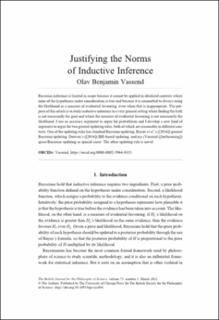Justifying the Norms of Inductive Inference
Peer reviewed, Journal article
Accepted version
Permanent lenke
https://hdl.handle.net/11250/3031407Utgivelsesdato
2022Metadata
Vis full innførselSamlinger
Originalversjon
British Journal for the Philosophy of Science. 2022, 73 (2), 135-160.Sammendrag
Bayesian inference is limited in scope because it cannot be applied in idealized contexts where none of the hypotheses under consideration is true and because it is committed to always using the likelihood as a measure of evidential favouring, even when that is inappropriate. The purpose of this article is to study inductive inference in a very general setting where finding the truth is not necessarily the goal and where the measure of evidential favouring is not necessarily the likelihood. I use an accuracy argument to argue for probabilism and I develop a new kind of argument to argue for two general updating rules, both of which are reasonable in different con texts. One of the updating rules has standard Bayesian updating, Bissiri et al.’s ([2016]) general Bayesian updating, Douven’s ([2016]) IBE-based updating, and my (Vassend ([forthcoming]) quasi-Bayesian updating as special cases. The other updating rule is novel.
